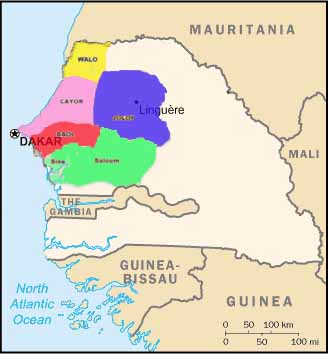|
Lebu Wolof
Lebu Wolof (Lebou Oulof) is a language of Senegal Senegal, officially the Republic of Senegal, is the westernmost country in West Africa, situated on the Atlantic Ocean coastline. It borders Mauritania to Mauritania–Senegal border, the north, Mali to Mali–Senegal border, the east, Guinea t ... that is closely related to, but not mutually intelligible with, Wolof proper. The distinctiveness of the language was obscured by the fact that all Lebu people are bilingual in Wolof.Hammarström (2015) Ethnologue 16/17/18th editions: a comprehensive review: online appendices Lebu Wolof is the source of standard Wolof, the national language of Senegal.Falola, Toyin; Salm, Steven J. Urbanization and African cultures. Carolina Academic Press, 2005. . p 280Ngom, Fallou. Wolof. Lincom, 2003. . p 2 References Lebu language {{Atlantic-lang-stub ... [...More Info...] [...Related Items...] OR: [Wikipedia] [Google] [Baidu] |
Senegal
Senegal, officially the Republic of Senegal, is the westernmost country in West Africa, situated on the Atlantic Ocean coastline. It borders Mauritania to Mauritania–Senegal border, the north, Mali to Mali–Senegal border, the east, Guinea to Guinea–Senegal border, the southeast and Guinea-Bissau to Guinea-Bissau–Senegal border, the southwest. Senegal nearly surrounds The Gambia, a country occupying a narrow sliver of land along the banks of the Gambia River, which separates Senegal's southern region of Casamance from the rest of the country. It also shares a maritime border with Cape Verde. Senegal's capital is Dakar. Senegal is the westernmost country in the mainland of the Old World, or Afro-Eurasia. It owes its name to the Senegal River, which borders it to the east and north. The climate is typically Sahelian, though there is a wet season, rainy season. Senegal covers a land area of almost and has a population of around 18 million. The state is a Presidential system ... [...More Info...] [...Related Items...] OR: [Wikipedia] [Google] [Baidu] |
Lebu People
The Lebu (Lebou, ''Lébou'') are a subgroup of Wolof in Senegal, West Africa, living on the peninsula of Cap-Vert, site of Dakar. The Lebu are primarily a fishing community, but they have a substantial business in construction supplies and real estate.Keese, Alexander, "Ethnicity and the Colonial State: Finding and Representing Group Identifications in a Coastal West African and Global Perspective (1850–1960)", BRILL (2015), p. 94/ref> They speak Lebu Wolof, which is closely related to Wolof proper but is not intelligible with it. Culture The Lebu political and spiritual capital is at Layene, situated in the Yoff neighborhood of northern Dakar. The largely Lebu religious sect and theocracy, the Layene, are headquartered there. In addition to Yoff, other Lebu centres are nearby Ouakam, Cambérène and Ngor. Lebu society emphasizes piety and respect for elders. Lebu families include not only living people but also associated ancestral spirits. The Lebu are noted for their ... [...More Info...] [...Related Items...] OR: [Wikipedia] [Google] [Baidu] |
Atlantic–Congo Languages
The Atlantic–Congo languages make up the largest demonstrated family of languages in Africa. They have characteristic noun class systems and form the core of the Niger–Congo family hypothesis. They comprise all of Niger–Congo apart from Mande, Dogon, Ijoid, Siamou, Kru, the Katla and Rashad languages (previously classified as Kordofanian), and perhaps some or all of the Ubangian languages. Hans Gunther Mukanovsky's "Western Nigritic" corresponded roughly to modern Atlantic–Congo. In the infobox, the languages which appear to be the most divergent are placed at the top. The Atlantic branch is defined in the narrow sense (as Senegambian), while the former Atlantic branches Mel and the isolates Sua, Gola and Limba are split out as primary branches; they are mentioned next to each other because there is no published evidence to move them; Volta–Congo is intact apart from Senufo and Kru. ''Glottolog'', based primarily on Güldemann (2018), has a more limi ... [...More Info...] [...Related Items...] OR: [Wikipedia] [Google] [Baidu] |
Senegambian Languages
The Senegambian languages, traditionally known as the Northern West Atlantic, sometimes confusingly referred to in literature as the Atlantic languages, are a branch of Atlantic–Congo languages most commonly spoken in Senegal and neighboring southern Mauritania, The Gambia, Guinea-Bissau, and Guinea. The nomadic Fula people have also spread their languages from Senegal across the western and central Sahel. The most populous unitary language is Wolof, the national language of Senegal, with four million native speakers and millions more second-language users. There are perhaps 13 million speakers of the various varieties of Fula, and over a million speakers of Serer . The most prominent feature of the Senegambian languages is that they are devoid of tone, unlike the vast majority of Atlantic-Congo languages. Classification David Sapir (1971) proposed a West Atlantic branch of the Niger–Congo languages that included a Northern branch largely synonymous with Senegambian. H ... [...More Info...] [...Related Items...] OR: [Wikipedia] [Google] [Baidu] |
Wolof Language
Wolof ( ; , ) is a Niger–Congo language spoken by the Wolof people in much of the West African subregion of Senegambia that is split between the countries of Senegal, The Gambia and Mauritania. Like the neighbouring languages Serer and Fula, it belongs to the Senegambian branch of the Niger–Congo language family. Unlike most other languages of its family, Wolof is not a tonal language. Wolof is the most widely spoken language in Senegal, spoken natively by the Wolof people (40% of the population) but also by most other Senegalese as a second language. Wolof dialects vary geographically and between rural and urban areas. The principal dialect of Dakar, for instance, is an urban mixture of Wolof, French, and Arabic. ''Wolof'' is the standard spelling and may also refer to the Wolof ethnicity or culture. Variants include the older French , , or , which now typically refers either to the Jolof Empire or to jollof rice, a common West African rice dish. Now-archaic forms incl ... [...More Info...] [...Related Items...] OR: [Wikipedia] [Google] [Baidu] |
